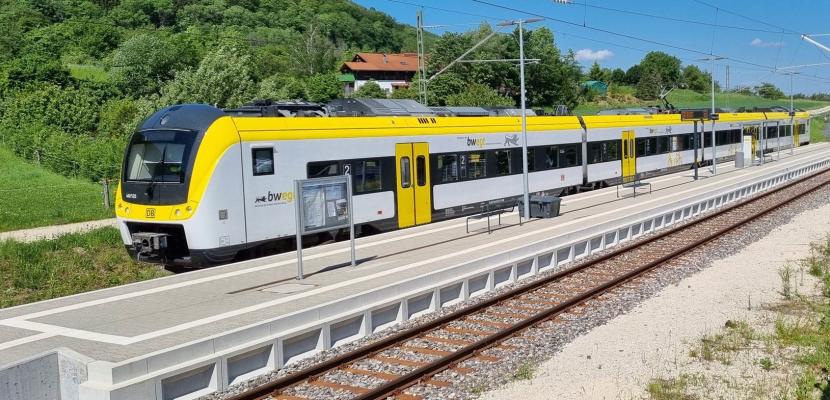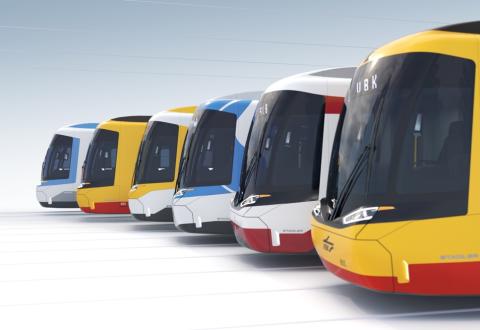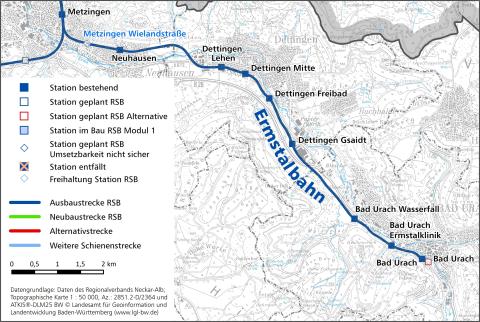
Reactivation of the Ermstalbahn in the Neckar-Alb Region

About this good practice
The reactivation and electrification of the Ermstalbahn promotes carbon-neutral transport, significantly cutting greenhouse gas emissions compared to motorized vehicles, contributing to climate change mitigation. By connecting urban and rural areas, the railway improves accessibility for various demographic groups. This enhances the attractiveness of the rural Swabian Alb as a place to live, creating employment and helping to combat depopulation. By ensuring that the Neckar-Alb region remains well-connected and viable, the project supports long-term regional growth. The revitalization of the Ermstal valley has strengthened its economy and boosted tourism, preventing the abandonment of these areas. Initiated in 1999 by a local citizens’ initiative, the Ermstalbahn is a model for sustainable regional development. A key challenge was securing co-financing from state, district, and local authorities. Ultimately, the expansion and electrification were completed between 2019 and 2022 as part of the Neckar-Alb regional light rail system. The project also builds resilience against extreme weather events, which can disrupt transport networks. A robust rail system ensures the region maintains connectivity and mobility even under such conditions. Additionally, the Ermstalbahn reduces the need for road expansions and parking, which typically require clearing natural habitats. By taking pressure off the region’s roads, the railway supports more sustainable land use and development.
Resources needed
Citizen initiative “Pro Ermstalbahn”
Regional Association policies and a special purpose association
Municipalities in the Erms Valley, Reutlingen district and Baden-Württemberg
ENAG annual costs (2013-2017): 200,500 EUR
Expansion and electrification (2017-2023): 31.5 million EUR
Evidence of success
Saved from closure, the Ermstalbahn project reduces emissions, improves rural access, and helps the Erms Valley and surrounding municipalities adapt to climate change. Offering hourly direct connections and faster travel than by car to Reutlingen, public transport now handles 70% of valley traffic. Since 2001, passenger numbers have risen by 65%. The “Pro Ermstalbahn” initiative united the community and local authorities, creating shared responsibility for the project's success.
Potential for learning or transfer
Depopulated areas face accessibility challenges, especially in tourism and attracting younger demographics. The Ermstalbahn’s revitalization offers a replicable, carbon-neutral model to address these issues. Connecting Bad Urach to the Neckar-Alb regional rail system, new stops in Dettingen and Bad Urach improve access to services like schools and healthcare, making rural areas more livable. Prioritizing railways improves accessibility across demographics, reducing depopulation. The Ermstalbahn highlights the benefits of investing in rail infrastructure for sustainable development, offering a framework for other regions to combat environmental degradation. Railways can help rural regions reduce their carbon footprint and improve connectivity. Quality public transport links rural areas to urban centers, preventing outmigration and ensuring demographic stability. Revitalized railways reduce car reliance and boost environmental resilience.
Further information
Images
Documents
Website
Good practice owner
You can contact the good practice owner below for more detailed information.
Zweckverband Regional-Stadtbahn Neckar-Alb


